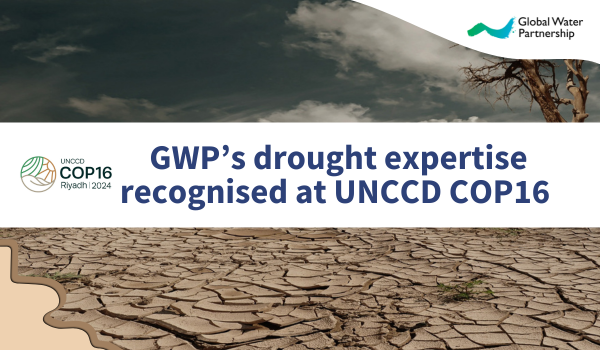GWP was present on-site at the United Nations Convention to Combat Desertification (UNCCD) COP16 with a small delegation, co-convening various sessions on drought management and participating in bilateral discussions with current and future key partners. Conference highlights include the launch of the UNCCD Community of Learning and Practice on Drought Resilience, which GWP implemented, and explicit mentions of GWP and the joint GWP-WMO drought programme (IDMP) by the Conference of the Parties.
The work of GWP and WMO on drought featured prominently in many discussions, including with country delegations, making it a significant success for GWP. However, in terms of the political process, countries ultimately could not agree on how binding a new potential drought framework or protocol could be, and therefore no specific decision on drought could be agreed upon. For the community, this remains a pressing issue that urgently needs to be addressed. GWP, together with WMO, stands ready to support countries in tackling this challenge.
 From the left: Sebastian Grey (WMO), Laurent-Charles Tremblay-Lévesque (GWP), Valentin Aich (GWP), Gergana Majercakova (GWP)
From the left: Sebastian Grey (WMO), Laurent-Charles Tremblay-Lévesque (GWP), Valentin Aich (GWP), Gergana Majercakova (GWP)
One of the top outcomes, from GWP’s perspective, was the high-level acknowledgement of our organisation’s expertise in the Conference Report. GWP and WMO and the shared Integrated Drought Management Programme (IDMP) are invited to strengthen their guidance to countries on aridity information in addition to drought. Under the section “Science-policy recommendations on aridity trends, projections and impacts,” the report states:
“The Conference of the Parties,
Recalling decisions 18/COP.15 and 17/COP.15, [...] and having considered document ICCD/COP(16)/CST/3 and the conclusions and recommendations contained therein,
1. Invites the World Meteorological Organization, the Global Water Partnership and other technical and scientific partners, working within their respective mandates, to integrate aridity information into existing drought monitoring and early warning systems, with the aim of developing a comprehensive monitoring approach that would:
(a) Enhance local, regional and global forecasting, monitoring and evaluation for land and water resource sectors;
(b) Explore the establishment of a standardized approach for robust aridity assessments which identify critical, science-based ecological, environmental and socio-economic thresholds, enabling adaptation and timely responses to critical water stress and drought conditions;
(c) Foster collaboration through the systematic sharing of interoperable data, lessons learned and best practices;
(d) Explore how to leverage advanced technologies, such as artificial intelligence which draws upon diverse data sources for predictive analysis;
2. Also invites the Integrated Drought Management Programme [by GWP & WMO], its cooperating partners and other technical and scientific partners, acting within their respective mandates, to facilitate, as appropriate, and in line with national circumstances, needs and priorities, the development of science-based standards and guidelines for assessing the socio-economic and environmental impacts of increasing aridity and drought that would:
(a) Facilitate consistent, cross-regional monitoring and analysis to promote adaptive responses to climatic, environmental and socioeconomic changes;
(b) Enable effective adaptation strategies that promote resilience among vulnerable communities, particularly in shared river basins and watersheds;
(c) Promote community-based monitoring and help to ensure inclusivity in assessing and addressing aridity and drought impacts by integrating Indigenous and traditional knowledge, as well as grassroot innovations into the process; and
(d) Support efforts to address and prioritize actions to combat/cope with aridity and drought and their impacts through knowledge-sharing and capacity-building initiatives.”
This recognition is highly significant since it provides GWP with a political mandate to further extend its support to countries in strengthening their resilience to drought and aridity.

